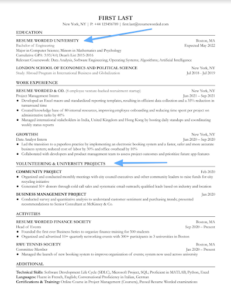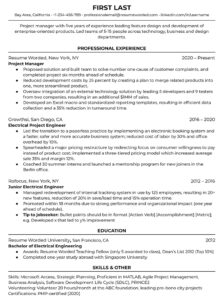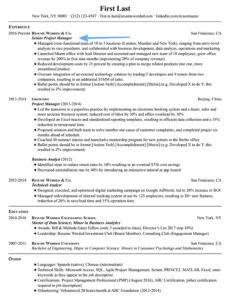Your resume or CV is a prospective employer’s first good look at who you are and what you do. When a business has a job opening, it means they have a problem that requires a solution (e.g., “this team needs leadership,” or “this project is rudderless and needs someone to manage it.”). When you apply for a position, you say, “I am the solution to your problem.” Your resume introduces you to the hiring company and makes the initial argument that you’re the answer they’re looking for. This attitude holds for any position within any industry.
So, if an organization needs a project manager, you must create a project management resume. Not only that, but you need to create a compelling resume that shows the hiring company that you have the skills and experience for the job.
This article shows you how to build a can’t-miss project management resume that will help further your career. We will cover some essential tips, what you should include, discuss examples, and even devote a few words to cover letters.
But first, let’s discuss the difference between a project manager’s CV and a resume.
How to Distinguish Between a CV and a Resume
Many people and organizations use the terms “resume” and “CV” interchangeably, especially in the United States and Canada. A CV, short for “curriculum vitae,” and is Latin for “course of life,” is predominantly geared towards academia and typically used by people applying for grants, fellowships, postdoctoral positions, and teaching or research positions in postsecondary institutions, or high-level industrial research positions. The word “resume” is French for “summary” and is used for applicants looking for work. So, for example, if you’re looking for a project manager position, odds are you want to assemble a comprehensive project manager skills resume instead of a CV.
Here’s a simple chart breaking down the primary differences between the two.
| Resume | CV |
| Focuses on skills | Focuses on academic accomplishments |
| Length is two pages maximum | Length is as long as is needed depending on academic experience and accomplishments. |
| Primarily used in applying for everyday commercial, industrial, and non-profit positions | Primarily used in applying for grants, fellowships, and academic positions. |
| Applicants with over one year of work experience should lead with that and put educational experience after | Applications should lead with educational experience, including dissertation title and summary, advisor name, merit or tenure reviews, etc. |
Now let’s go over the critical steps for building a project management (or PM) resume.
Also Read: Why Study Project Management? Top 5 Reasons
Job Winning Project Manager Resume Formula: A Step by Step Guide
Managers are organized; you must demonstrate that from the start by having a well-organized resume. A solid project management resume needs structure and logic, showing that your project management skills extend to creating a clear, intelligent document. Follow these steps, and you can’t go wrong.
1) Starting Off. Use the commonly accepted reverse-chronological format, first with your most recent experience, then working your way back through your history. This resume style immediately shows the reader who you are and what you’re doing: your skills, strengths, and experience. Divide your document into these resume parts:
a) Header (contact info)
b) Summary Statement and Career Objective
c) Work experience
d) Education
e) Skills
f) Miscellaneous Sections (extra training, volunteering, certifications, etc.)
2) Create the Header. Place your contact information in the resume header.
a) Name
b) Address
c) Phone number
d) Email address
3) Write Up Your Summary Statement and/or Career Objective. This summary is a single paragraph that tells the reader who you are and your career objective. Keep it brief, informative, and to the point.
4) Add Your Work Experience. This section is what the boss and HR manager will focus on primarily.
a) Begin by listing your most recent job title
b) Add the company’s name and your start and finish dates if the latter is applicable
c) Write a job description reflecting your project management roles, focusing more on your accomplishments than duties and responsibilities
d) Create at least five bullet points to showcase your achievements
5) Add Your Educational Background. Here’s where you show your educational history and achievements. Include points like:
a) Relevant courses, majors, and degrees
b) Appropriate projects or other academic accomplishments
c) Did you make the dean’s list?
d) Latin honors (summa cum laude, etc.)
e) Extracurricular activities
f) Any studies conducted abroad
g) Your GPA
6) Add Your Relevant Skills. Project manager skills vary depending on your primary field of expertise and, subsequently, the position you’re applying for. For example, technical project management skills listed on a resume will differ from those of a digital project manager. We will cover the recommended skills to place in your project management resume later on.
7) Wrap Things Up With “Extras.” Add eye-catching strengths that show the reader how well-rounded and versatile you are. These extras can include professional achievements, conferences you attended or spoke at, interests, industry awards, and relevant projects. Also, add in the following:
a) Resume licenses and certifications. If you still need to get certificates, we got you covered. Check out the end of the article!
b) Volunteer work, especially if it’s relevant to the position. Volunteering shows your civic-mindedness and teamwork skills.
c) Languages spoken. While optional, it’s okay to call out any languages you can speak, bearing in mind the increased globalization of our economies.
8) Create Your Cover Letter. We’ll discuss the cover letter particulars later.
Now, about those keywords every good project manager’s resume summary needs to stand out.
Also Read: Top Project Manager Interview Questions and Answers
The Secret of Keywords
Anyone who has used a search engine knows the importance of keywords. Here is a collection of eye-catching keywords (including skills) that will make any HR professional or hiring manager take notice.
1) Active listening
2) Adaptability
3) Budget management
4) Coaching
5) Conflict management
6) Critical thinking
7) Delegation
8) Detail-oriented
9) Diplomacy
10) Interpersonal skills
11) Leadership
12) Motivation
13) Negotiation
14) Organization
15) Policy knowledge
16) Prioritization
17) Problem-solving
18) Project management software
19) Reporting skills
20) Research skills
21) Risk management
22) Salesforce
23) Scheduling
24) Strategic planning
25) Stress tolerance
26) Team management
27) Technical writing
28) Tenacity
29) Time management
30) Verbal communication
Tips: Generic Project Manager Resume Summary
1) When you design your resume, use white space intelligently, employ eye-friendly headings, and use clear fonts for an Applicant Tracking System (ATS) friendly resume.
2) If you have years of experience, write a two-page resume. Otherwise, everything should fit on a single page.
3) Don’t call out negatives. Don’t tell the employer the tasks you weren’t assigned or the things you didn’t do. Keep it positive. Emphasize the wins in your history as a project manager.
4) Pick a layout that makes scanning your resume easy.
5) Find project management skills in the job’s posting online and sprinkle them through your resume.
6) Proofread your project management resume. Refrain from letting your case get derailed by bad grammar and spelling errors.
7) Use action verbs but use them sparingly. Here’s a list of exciting action words that will make your resume pop.
a) Advised
b) Championed
c) Cultivated
d) Directed
e) Empowered
f) Ensured
g) Executed
h) Furthered
i) Guided
j) Hired
k) Implemented
l) Integrated
m) Mentored
n) Motivated
o) Optimized
p) Oversaw
q) Predicted
r) Resolved
s) Revitalized
t) Shaped
And here’s a list of action verbs that quickly wear thin. Avoid them as much as possible.
1) Improved
2) Led
3) Managed
4) Participated
5) Took part in
6) Worked on
7) Remember your social media presence. Diligent, thorough employers will look you up online, so ensure your online presence shows you in the best light. Also, update and optimize your LinkedIn summary and profile.
8) Finally, and most importantly, save your project management resume template as a PDF to maintain your resume formatting. Word and other file formats can mess with your formatting.
Also Read: Program Manager vs. Project Manager: Here Are the Differences You Should Know
Entry Level Project Manager Resume Tips
Here are some things to remember when building a functional entry level project manager resume. If you’re shooting for an entry level position, you most likely do not have significant job experience. So, lead off with your educational history, putting your strengths at the forefront. If you had a high GPA or earned academic honors, put them here, along with any coursework or projects that could be relevant for a project management role.
If you’ve performed internships, community service, or other appropriate projects, include them. They show who you are and what your strengths are.
Here are the skills most relevant to an entry level position.
1) Business Analysis
2) Business Process Improvement
3) Copy Protection
4) Enterprise Software
5) Integration
6) Microsoft Project
7) Program Management
8) Requirements Analysis
9) Team Leadership
Experienced Level Project Manager Resume Tips
Unsurprisingly, a project manager resume geared towards a position that requires a high level of experience must be approached differently than an entry level project manager resume. When you apply for a project manager position requiring knowledge, you must show that you have the right skills and work experience for the job. For example, your skills section and work history highlight your communication, time management, and planning abilities. Also, call them out if you have experience with specific project management methodologies or software.
Here are the skills recruiters typically look for in experienced project manager positions.
1) Agile and Waterfall Methodologies
2) Business Process Improvement
3) Copy Protection
4) Microsoft Project
5) Project Management
6) Scrum
7) Software Development Life Cycle (SDLC)
8) Vendor Management
All About Your Cover Letter
Although many of today’s resumes are delivered via e-mail rather than traditional post, most employers still expect a cover letter. If a resume is your introduction to the company, the cover letter is the introduction to your resume.
Keep your letter brief, highlighting your most impressive accomplishments and experience. Here are the steps to writing a successful project manager CV:
1) First, make sure your letter is formatted correctly.
2) Next, make the opening paragraph engaging to the reader.
3) Next, use the middle section to show you understand the position.
4) Finally, offer something the company is looking for.
5) Also, personalize your cover letter by adding the addressee’s name. Finally, for extra credit, check out the organization’s website and mention something about it that stood out for you. This tactic shows the reader that you cared enough about them that you researched the organization and visited their website. Companies love that!
Project Management Resume Examples
Let’s look at some project management resume examples and see which works best for you and the position you’re looking for. These template examples all come courtesy of Resumeworded.com.
Here’s an entry level project management resume example.

Here is a standard project management resume, assuming a given level of relevant experience.

And finally, here’s a sample resume for a senior project manager position.

Also Read: Project Leader: Skills, Responsibilities, Job Description, Salary & Everything You Should Know
Do You Want Expert Project Management Training and Certification?
Every good project management resume needs to show relevant skills, and you can get those valuable, sought-after skills by getting certified. If you want to take on the challenging role of a project manager, UMass Amherst’s Isenberg School of Management has an Online Project Management certification that will equip you with the necessary skills to master project management. This six-month online bootcamp is aligned with PMI-PMP® and IASSC-Lean Six Sigma and presents live online classes and capstone projects designed to teach you valuable project management skills like:
1) Agile Management
2) Customer experience design
3) Design Thinking
4) Digital Transformation
5) Leadership Skills
6) Lean six sigma green belt LSSGB
7) Project Management
8) Project Risk Management
Additionally, students can earn 146 PDUs to maintain their CCR for PMI-related certifications. Finally, you will get your certificate and membership in the UMass Amherst Alumni Association when you complete the course.
Indeed.com reports that project managers in the United States earn an average of $84,049 per year and can top $131K. So, join this fantastic project management bootcamp and make your resume pop, setting it apart from the average crowd and improving your chances of landing that outstanding position. Sign up today!
You might also like to read:
Best Apps for Project Management You Should Know
What are PDUs in PMI? A Complete Guide
Is Project Management a Good Career? Here’s What You Need to Know
Top 12 Must-Read Books for Project Management
What is Project Management? Tools, Process & Everything You Should Know







